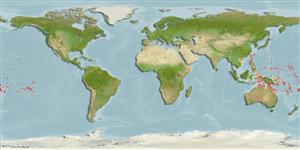Teleostei (teleosts) >
Holocentriformes (Squirrelfishes, soldierfishes) >
Holocentridae (Squirrelfishes, soldierfishes) > Myripristinae
Etymology: Myripristis: Greek, myros, -ou = male of morey eel + Greek, pristis = saw (Ref. 45335).
Eponymy: Loren P Woods (1914–1979) was Curator, Department of Ichthyology (1941–1978), Field Museum of Natural History, Chicago, where he worked (1938–1978), broken only by service in WW2 in the US Navy (1943–1946). [...] (Ref. 128868), visit book page.
More on author: Greenfield.
Environment: milieu / climate zone / depth range / distribution range
Ecology
Marine; reef-associated; depth range 2 - 20 m (Ref. 86942). Tropical; 26°N - 24°S
Pacific Ocean: islands of Oceania except Hawaii, Easter Island, Pitcairn Group or islands off the Plate such as Solomon Islands and New Caledonia. Also Caroline Islands to the Line Islands (Kiribati); north to Bonin and Marcus Islands; south to Samoa and Tuamoto Islands, including Micronesia (Ref. 1602).
Size / Weight / Age
Maturity: Lm ? range ? - ? cm
Max length : 26.5 cm TL male/unsexed; (Ref. 89972)
Dorsal spines (total): 11; Dorsal soft rays (total): 13 - 14; Anal spines: 4; Anal soft rays: 10 - 13. This species is the only Micronesian large-scaled Myripristis that lacks scales on its inner pectoral axil. It also differs by having a white spot on the upper inner pectoral axil and combination of dark red (versus black) opercular membrane, dark red or purple pectoral axil, distinct white ring around the iris, an white anterior margins of its pelvic an soft rayed fins.
Inhabits reef flats, lagoons, and seaward reefs (Ref. 9710). Commonly found on exposed outer-reef areas; often at low islands and atolls than high islands (Ref. 12419). Feeds on zooplanktons (Ref. 89972).
Life cycle and mating behavior
Maturity | Reproduction | Spawning | Eggs | Fecundity | Larvae
Randall, J.E. and D.W. Greenfield, 1996. Revision of the Indo-Pacific holocentrid fishes of the genus Myripristis, with descriptions of three new species. Indo-Pac. Fish. (25):61 p. (Ref. 12419)
IUCN Red List Status (Ref. 130435: Version 2024-2)
Threat to humans
Harmless
Human uses
Fisheries: commercial
Tools
Special reports
Download XML
Internet sources
Estimates based on models
Preferred temperature (Ref.
123201): 25.7 - 29.4, mean 28.3 °C (based on 1027 cells).
Phylogenetic diversity index (Ref.
82804): PD
50 = 0.5000 [Uniqueness, from 0.5 = low to 2.0 = high].
Bayesian length-weight: a=0.02512 (0.01502 - 0.04202), b=2.97 (2.83 - 3.11), in cm total length, based on LWR estimates for this species & Genus-body shape (Ref.
93245).
Trophic level (Ref.
69278): 3.5 ±0.5 se; based on size and trophs of closest relatives
Resilience (Ref.
120179): High, minimum population doubling time less than 15 months (Preliminary K or Fecundity.).
Fishing Vulnerability (Ref.
59153): Low vulnerability (17 of 100).
Nutrients (Ref.
124155): Calcium = 67.2 [30.9, 196.3] mg/100g; Iron = 0.703 [0.290, 1.430] mg/100g; Protein = 18.6 [17.5, 19.8] %; Omega3 = 0.148 [0.061, 0.337] g/100g; Selenium = 28.7 [17.0, 52.4] μg/100g; VitaminA = 72 [27, 188] μg/100g; Zinc = 1.36 [0.89, 2.08] mg/100g (wet weight);
